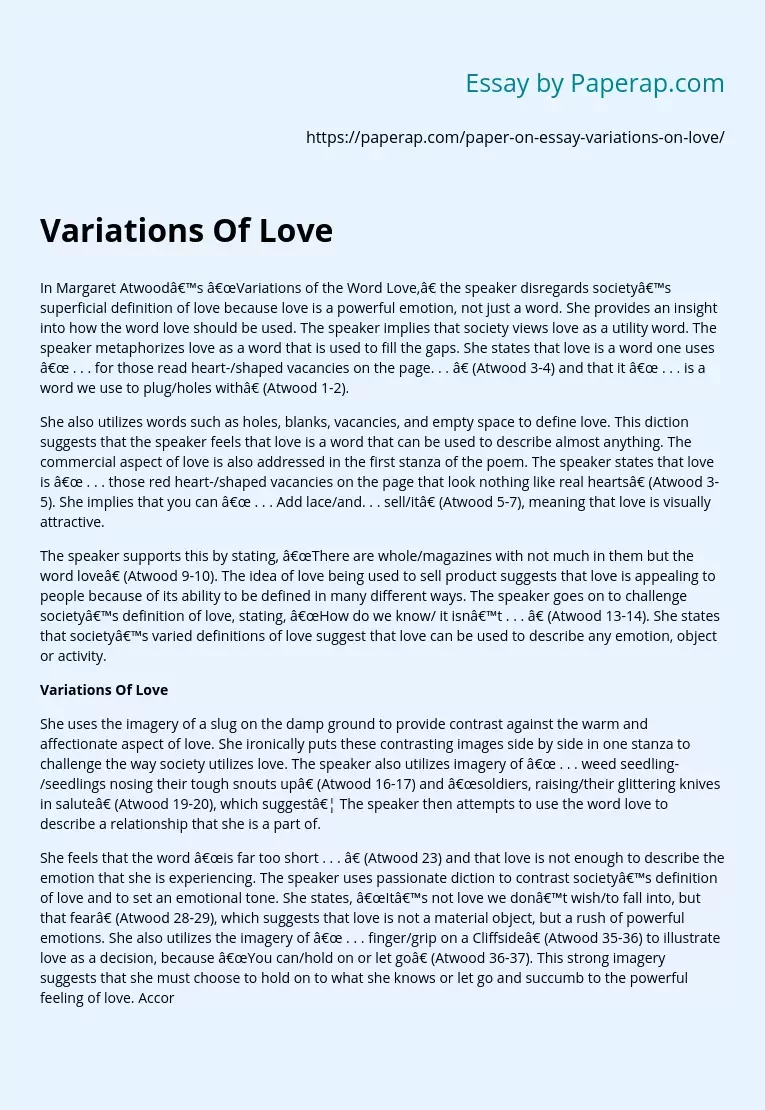Variations Of Love
In Margaret Atwood’s “Variations of the Word Love,” the speaker disregards society’s superficial definition of love because love is a powerful emotion, not just a word. She provides an insight into how the word love should be used. The speaker implies that society views love as a utility word. The speaker metaphorizes love as a word that is used to fill the gaps. She states that love is a word one uses “ . . . for those read heart-/shaped vacancies on the page.
. . ” (Atwood 3-4) and that it “ . . . is a word we use to plug/holes with” (Atwood 1-2).
She also utilizes words such as holes, blanks, vacancies, and empty space to define love. This diction suggests that the speaker feels that love is a word that can be used to describe almost anything. The commercial aspect of love is also addressed in the first stanza of the poem. The speaker states that love is “ . . . those red heart-/shaped vacancies on the page that look nothing like real hearts” (Atwood 3-5).
She implies that you can “ . . . Add lace/and. . . sell/it” (Atwood 5-7), meaning that love is visually attractive.
The speaker supports this by stating, “There are whole/magazines with not much in them but the word love” (Atwood 9-10). The idea of love being used to sell product suggests that love is appealing to people because of its ability to be defined in many different ways. The speaker goes on to challenge society’s definition of love, stating, “How do we know/ it isn’t .
. . ” (Atwood 13-14). She states that society’s varied definitions of love suggest that love can be used to describe any emotion, object or activity.
Variations Of Love
She uses the imagery of a slug on the damp ground to provide contrast against the warm and affectionate aspect of love. She ironically puts these contrasting images side by side in one stanza to challenge the way society utilizes love. The speaker also utilizes imagery of “ . . . weed seedling-/seedlings nosing their tough snouts up” (Atwood 16-17) and “soldiers, raising/their glittering knives in salute” (Atwood 19-20), which suggest… The speaker then attempts to use the word love to describe a relationship that she is a part of.
She feels that the word “is far too short . . . ” (Atwood 23) and that love is not enough to describe the emotion that she is experiencing. The speaker uses passionate diction to contrast society’s definition of love and to set an emotional tone. She states, “It’s not love we don’t wish/to fall into, but that fear” (Atwood 28-29), which suggests that love is not a material object, but a rush of powerful emotions. She also utilizes the imagery of “ . . . finger/grip on a Cliffside” (Atwood 35-36) to illustrate love as a decision, because “You can/hold on or let go” (Atwood 36-37). This strong imagery suggests that she must choose to hold on to what she knows or let go and succumb to the powerful feeling of love. According to the speaker, love is too sparse of a word to describe her emotions. She challenges society’s use of a four-letter word to describe such a deep and powerful sensation. She introduces her idea that instead of using love, the single vowel “O” could be enough to explain such feeling.
Variations Of Love. (2019, Dec 05). Retrieved from https://paperap.com/paper-on-essay-variations-on-love/

